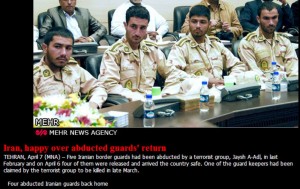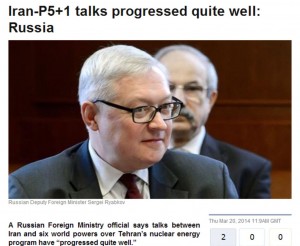Iran Still Refusing to Confirm Death of Missing Border Guard
I have been following the story of the five Iranian border guards who were abducted in early February by the Jeish Al-Adl terrorist group. Late in March, the group claimed to have executed one of the guards. Last week, four guards were released and eventually made their way back into Iran, presumably from where they were being held just across the border in Pakistan. Iran’s statements relating to the group’s claim of killing one guard have been quite strange, alternating between stating flatly that he has been executed while also stating that they can neither confirm nor deny his death.
The speaker of Iran’s Parliament added yet another twist to the string of strange statements, today issuing a call for Pakistan to “release” the fifth guard, but the story as it is presented by Fars News appears to leave open whether he is calling for release of a living person or the body of a dead one:
Iranian Parliament Speaker Ali Larijani called on the Pakistani officials to double their efforts to release the 5th Iranian border guard who was abducted by Jeish al-Adl terrorist group in February and kept hostage despite the freedom of his other four colleagues.
“The Pakistani government should certainly be accountable and provide the ground for the freedom of the 5th Iranian border guard as soon as possible,” Larijani said in an open session of the parliament in Tehran on Tuesday.
His remarks came amid reports and claims by Jeish al-Adl that the terrorist group has killed, Jamshid Danayee-Far, one of the Iranian border guards kidnapped along Iran-Pakistan borders in February.
The five Iranian border guards were abducted in Jakigour region of Iran’s Sistan and Balouchestan Province on February 6 and taken to Pakistan. Jeish al-Adl claimed late last month that it has executed Danayee-Far.
Meantime, Governor-General of Iran’s Southeastern Sistan and Balouchestan province Ali Awsat Hashemi this weekend confirmed the death of Danayee-Far, and said Iran is waiting for the transfer of his body.
Just yesterday, we had another “cannot confirm nor deny” version:
Iran’s interior minister has said due to lack of sufficient evidence, Iran could not confirm abducted guard’s death.
Speaking in the sidelines of country’s governors gathering, Abdurreza Rahmani Fazli pointed to the abducted guard’s martyrdom. “Available information and document do not compel us to confirm the guard’s death,” he said, adding that “we do not have sufficient information and four released soldiers who returned back to the country do not know anything about the other abducted guard – Jamshid Danaeifar.”
Complicating matters even further, Al Monitor reports that no video or photo has appeared to confirm Danaeifar’s death and that Jeish Al-Adl has even removed their claim of killing him from their website: Read more →


